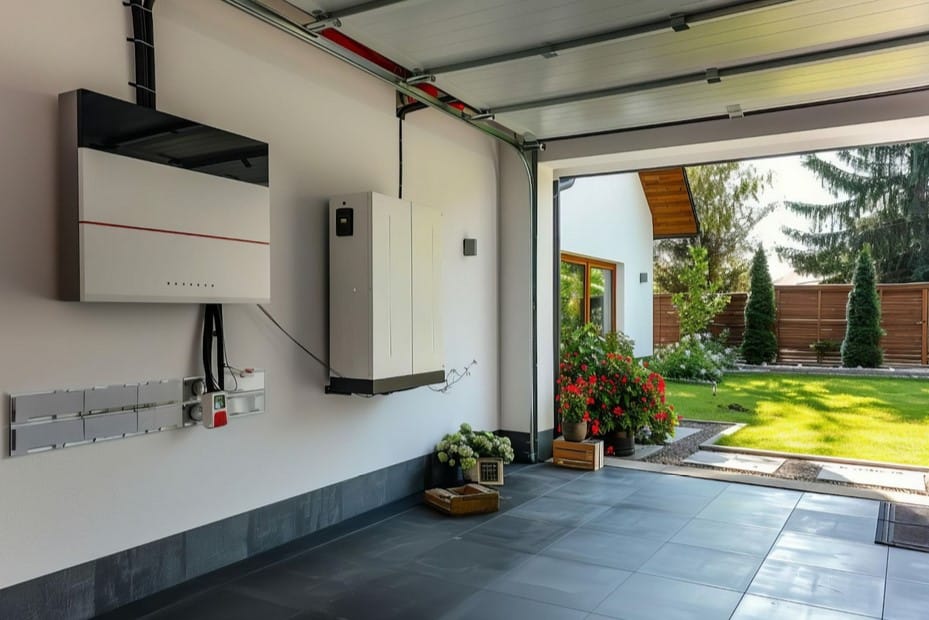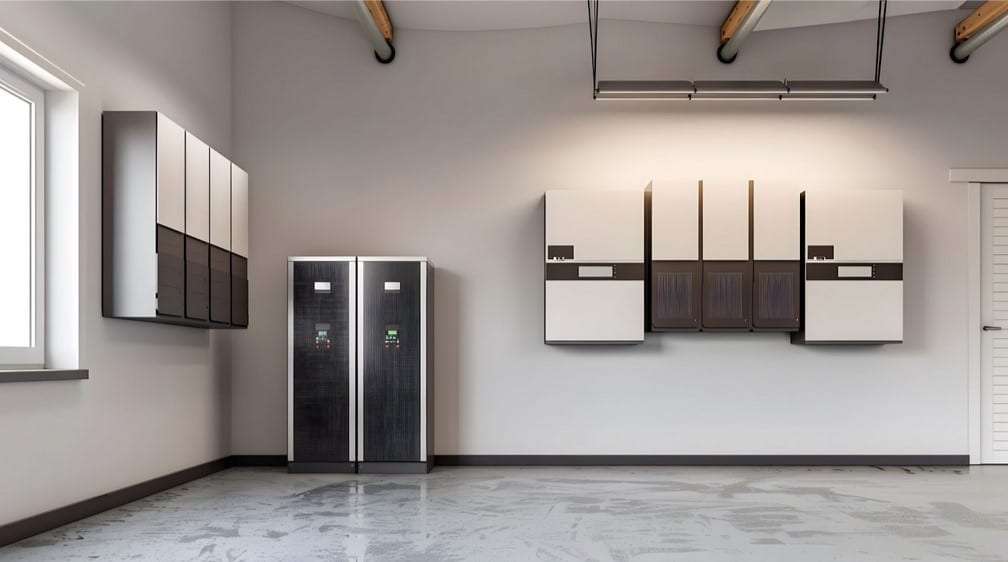In recent years, power outages have become more and more common. Whether they only last a couple hours or a couple of days, they still significantly and negatively affect our daily lives. During a short power outage, we might simply be unable to stream television or finish cooking dinner. A longer power outage can prevent you from heating or cooling your home, spoil your perishable foods and potentially impact your health.
A home solar energy investment can benefit your home, by offering lower energy costs and energy independence. However, a solar-only system alone will not continue to provide you electricity during these times of power outages. Many think that because they have their own solar energy system for their home that power outages won’t affect them. Unfortunately, this is not the case with solar-only systems. Unless your system is off the grid, your solar panels will shut off during a power outage.
This is why solar energy systems with battery storage can benefit homeowners in areas impacted by frequent power outages or extreme weather. A storage battery can provide your home with electricity while the grid goes down.
What are Power Outages?
A power outage, also known as a blackout, occurs when there is a temporary loss of electricity in a specific area. This disruption can be caused by a variety of factors, including severe weather events like storms or high winds, equipment failure, accidents or planned maintenance by utility companies. Power outages can last from a few seconds to several days, depending on the severity of the cause and the time needed for repair.
During a power outage, homes lose access to essential electrical services, which can affect lighting, heating, cooling and the operation of appliances and electronic devices. In more extreme cases, power outages can disrupt transportation, communication and emergency services. Some outages are localized, impacting only a few buildings or blocks, while others can spread across large regions, especially in the event of widespread grid failures.
To mitigate the impact of power outages, many homes and businesses rely on backup generators or solar energy systems with battery storage to provide temporary power until service is restored. The vast majority of homeowners are dependent on the utility grid, which is subject to many factors outside of our control — such as excessive usage, extreme weather or natural disasters. A solar-plus-storage system can help secure homeowners and offer power throughout the blackout.
What Happens to My Solar Home During a Power Outage?
Solar panel systems typically stop working during a power outage for safety reasons. Most solar systems are connected to the electrical grid and when the grid goes down, the system automatically shuts off to prevent electricity from being sent back into the grid. This process, known as “anti-islanding,” protects utility workers who may be repairing power lines during the outage. If solar panels were still sending electricity to the grid, it could pose a serious safety hazard.
Another reason solar panel systems stop during outages is that most systems rely on inverters to convert the direct current (DC) electricity generated by the panels into usable alternating current (AC) for your home. Inverters typically require grid power to function. Solar energy is produced into direct current. Our homes need alternating current for energy to flow all throughout the house. The DC is converted to AC by a tool called the inverter. When your neighborhood loses power on the grid, this inverter is automatically shut off due to safety reasons. If the inverter were to continue working, it poses a greater risk to the grid and the people who are working to fix the power outage.
However, if a solar system is paired with battery storage, it can still provide electricity during an outage. In this case, the stored energy in the batteries can power essential appliances and systems in the home. Battery storage systems are designed to disconnect from the grid and continue operating independently, offering backup power until the outage is resolved.
Why is My Solar Home Connected to The Grid?
While off the grid solar solutions exist, many solar homeowners are still connected to the utility grid. Your solar system is still connected to the power grid because there are days when your solar system may not produce enough energy to power your home due to weather conditions.
On those days when your system didn’t produce enough electricity, you will continue to get your electricity from the power grid. Additionally, if you need electricity at night — you will need to draw electricity from the power grid or a storage battery. Similarly, if your solar system produces more than enough electricity for your home, your excess energy is sent back to the grid.
By adding a storage battery and islanding capabilities, your solar home can continue to be on the utility grid and stay powered during a blackout. Enact acts as a trusted advisor for homeowners seeking residential solar and storage solutions. If you want to add a battery for energy security, be sure to mention this to your Enact home energy advisor during your free consultation.

What is a Storage Battery?
A storage battery, also known as a home battery or solar battery, is a system that stores electricity — typically, the excess energy produced by your solar panels during the day. The battery then stores this energy to be used later during other times.
Although you don’t need to have solar panels with a storage battery, they pair great together and equip homeowners to use more clean, low-cost energy. A storage battery system can pull energy from the power grid, but can also store excess solar energy for later use.
Storage battery owners can use battery energy at night or on rainy days, when solar panels are not producing electricity. Battery storage can also be used during peak hours under a time-of-use plan or to prevent homeowners from paying higher tiered utility rates. Most importantly though, a storage battery will release its stored energy when wanted, such as a power outage and keep the lights on in the blackout.
Solar batteries range widely in price, anywhere from $6,000 to $23,000. While this may be an investment, batteries can last you up to 15 years and empower homeowners to get the most out of their solar system. Additionally, for homeowners in California under NEM 3.0 — a solar-plus-storage system sees advantageous payback periods due to the end of net metering.
Why You Should Get a Storage Battery
There are multiple benefits in owning a storage battery to go along with your solar energy system. Batteries help us maximize the use of their renewable energy and also lessen our dependence on fossil fuels.
For homeowners in areas that experience frequent power outages, an important benefit of a storage battery system is energy independence and security. Being able to have electricity during a power outage offers comfort and safety.
When the power goes out, a solar-only system will shut off to protect the safety of utility technicians. A storage battery can store your low-cost solar electricity, which can be used during a power outage and extreme weather conditions.
Despite the upfront investment into a storage battery, a solar-plus-storage system experiences an advantageous payback period and return on investment. Batteries allow you to use more of your solar-generated electricity and use it at night, on a rainy day or during high-usage times. Solar-generated electricity is a use-it-or-lose-it commodity, where the electricity has to be used or sent to the grid. A battery system allows you to use your solar energy around the clock.

If you’re a happy solar homeowner and want to add a storage battery, Enact’s team of home energy advisors are here to help. Our team of in-house advisors are knowledgeable on storage battery options and how to find the right selection for your existing system.
Using our next-generation solar and energy storage design software, Enact can model and size different battery options with your current solar system. Enact customers get a choice in their battery manufacturer and system size to meet their needs. After we find the right battery for your home, Enact will coordinate the installation process with a trusted partner in your area for your convenience.
How Enact Helps Homeowners Get Solar and Storage Solutions
At Enact Solar, we understand the importance of keeping your home powered during outages and how crucial it is to find the right solar and storage solution. Our platform provides homeowners with custom solutions tailored to their unique energy usage, home size and backup power needs.
With Enact’s platform, you can find the right design for your solar and battery system with an Enact home energy advisor. Enact simplifies the solar and storage journey, while offering our customers choice and transparency throughout the process.
Whether you’re looking to protect your home from blackouts or simply want to reduce your reliance on traditional energy sources, Enact Solar offers the personalized support and technology you need to achieve energy security and savings. Get in touch today to learn how we can customize the perfect solar and storage solution for your home. Schedule a free consultation and receive your free solar and storage proposal.

